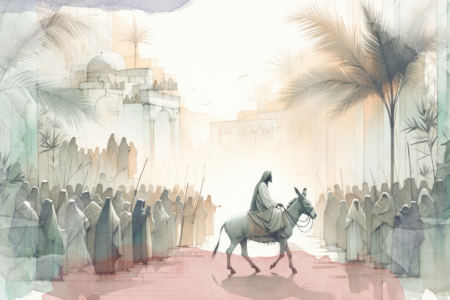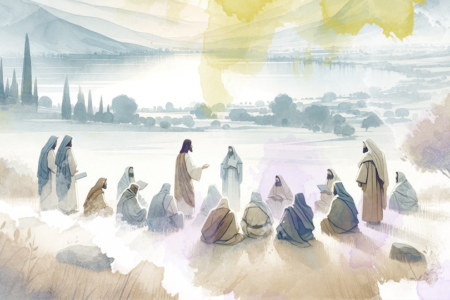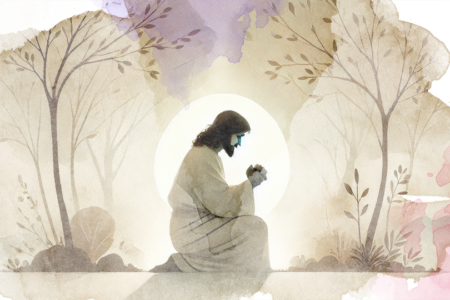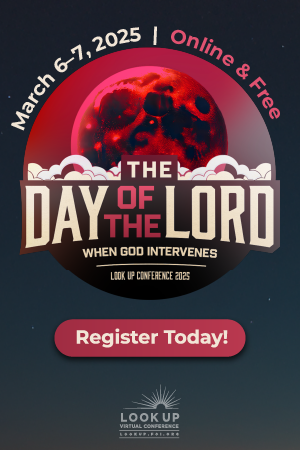The Life, Times And Message Of Isaiah The Prophet PART XXVI
GOD’S PURPOSE FOR JERUSALEM
ISAIAH CHAPTERS 29 and 30
Isaiah 29:1-8
1 Woe Ariel, Ariel, the city where David encamped,
Add year to year, let the feasts come around!
2 Then will I distress Ariel,
And there shall be moaning and groaning,
And she shall become to Me Ariel—a hearth of God.
3 And I will encamp against thee round about,
And will lay siege against thee with a mound,
And will raise siege against thee.
4 And brought low, thou shalt speak from the ground,
And from the dust thou shalt mutter thy speech.
And thy voice shall be like that of a ghost from the ground.
And out of the dust shalt thou hiss thy speech.
5 And the multitude of thy foes shall be like fine dust,
And the multitude of the oppressors like the driven chaff,
It shall come to pass in an instant, suddenly.
6 Thou shalt be visited by the Lord of hosts,
With thunder, with earthquake and with a great roar,
With whirlwind, with tempest and with the flame of a consuming fire.
7 And it shall be like a dream, like a nightmare,
The horde of nations that war against Ariel,
And that distress her.
8 And it shall be as when the hungry man dreams that he eats,
But when he wakes up and behold, his soul is empty.
Or when the thirsty man dreams that he drinks
But when he wakes up and behold, his soul is parched with thirst.
So shall the multitude of nations be,
That war against mount Zion.
Comment:
1 Woe Ariel, Ariel!
Jerusalem is poetically called “Ariel,” a compound word which means “the hearth of” (ari) and “God” (El). It is “the hearth of God” because here was the temple and the altar of God where sacrifices were brought to Him.
The city where David encamped. . . .
Jerusalem was the city which David conquered and fortified, and which was named after him “The City of David.” Here he achieved his great victory over the Jebusites, and laid the foundation of his kingdom.
Add year to year, let the feasts come around. . .
Year after year passes and Jerusalem continues to celebrate her perennial feasts without caring about the future.
2 But the Lord is about to distress Ariel—the altar of God. Then there shall be moaning and groaning everywhere. Only then will Jerusalem become “Ariel” a true altar of God.
3-5 Isaiah describes the pending siege and humiliation of Jerusalem by a horde of hostile invaders, which will be as thick as fine dust. The city, once so joyful and full of clamor and noise, will whisper from the ground as if it were a habitation of ghosts.
6-8 But when all will appear lost and the proud city about to be violated by the invaders, God will visit Jerusalem with thunder and earthquake. In the hour of their seeming triumph, the enemies of Zion shall wake up as if from a bad dream. Their expectation of victory shall turn into a nightmare.
Isaiah 29: 9-12
9-12 The incredible obtuseness of the people of Jerusalem who fail to understand the Lord’s repeated warnings.
9 Be amazed and bemused,
Shut your eyes and be blind,
You who are drunk but without wine,
Who stagger, yet without strong drink.
10 For the Lord has poured out upon you
The spirit of deep sleep and has closed your eyes.
The prophets and the heads and the seers has he covered.
11 And the vision of all this has become to you like the
words of a sealed book, which when it is given to one who is
learned, and he says please read this, he replies, “I cannot
because it is sealed.”
12 Then the book is given to one who is unlettered, saying
please read this, and he says, “I cannot because I am not learned.”
Comment:
9-12 The prophet decries the astounding and willful obtuseness of the people. They have shut their eyes to the truth and behave like drunkards without actually being drunk (v. 9). Isaiah concludes that this state of mind is the result of God’s punishment. He has sent a deep hypnotic sleep (“tardemah”—the same word appears in Genesis 2:21) upon the prophets and the leaders of Jerusalem. The word “seer” is synonymous with “prophet,” and is used here for emphasis. The “heads” are the rulers of the people. This spiritual blindness has affected both the educated and the uneducated. The educated man is unwilling to read the signs of the times, and refuses to break the seal of the book or scroll, which the prophet offered them to study, while the uneducated man is unable to read. One way or the other both are blind, with a blindness which is either self-imposed or God-inflicted as a punishment for their insincerity and hypocrisy. Since at the time when the prophet wrote the above oracle the Old Testament was not yet completed, it must be assumed that Isaiah was referring either to his own book of prophecies, or to the books of Moses.
13-14 The piety of the people is superficial and mechanical, not from the heart.
13 And the LORD said, because this people draw near to
me with their mouth and honor me with their lips,
But their heart is far removed from me,
And their fear of me is a man-made commandment,
learned by heart.
14 Therefore will I do a marvelous work with this
people, wonderfully and wondrously,
And the wisdom of their wise men shall perish,
And the insight of their prudent men shall become obscured.
Comment:
13-14 When men willfully blind themselves to God and their worship becomes mere ritual, without heart or soul, He imposes upon them the penalty of their superficiality and insincerity. Their wisdom ceases to be wisdom and their insight or intelligence (binah) is darkened. This is the remarkable and astonishing work of God. From the perspective of twenty-five centuries, the modern reader of Isaiah can only stand amazed at the truth of these words, which apply with equal force not only to ancient Israel but to the human race in every generation.
15-24 The evil counselors shall fail because of their perversity.
15 Woe to them that search deep to conceal their plan from the LORD.
Who work in the dark and say:
“Who sees us and who knows us?”
16 Oh, your perversity!
Should the potter be considered the same as the clay?
Should the thing which was made say of its maker,
“He made me not”?
Or a thing framed say of Him that framed it,
“He has no understanding”?
17 Is it not so that in a very short time
Lebanon shall be turned into a fruitful field,
And the fruitful field shall be considered as a forest?
18 In that day shall the deaf hear the words of a book,
And the eyes of the blind shall see out of obscurity
and out of darkness.
19 And the humble shall increase their joy in the LORD,
And the needy among men shall rejoice in the Holy One of Israel
20 For the tyrant shall come to nought,
And the scoffer shall cease,
And they that watch for iniquity shall be cut off.
21 Who condemn a man for a word,
Who lay a snare for him, that reproves in the gate,
And turn aside the cause of the just man with a hollow excuse.
22 Therefore thus says the LORD to the house of Jacob,
He who has redeemed Abraham,
Jacob shall no longer be ashamed,
And his face shall no longer grow pale.
23 For when his children shall see the works of My hands,
They shall hallow My name.
And they shall sanctify the Holy One of Jacob,
And stand in awe of the God of Israel!
And they who err in spirit shall come to understanding,
And the murmurers shall learn instruction.
Comment:
15 Woe to them that seek to conceal their plans from the LORD.
A powerful group, probably closely linked to the political and military and leadership of Judah, was apparently pressing King Hezekiah to ally himself with Egypt against the Assyrians. Aware that Isaiah was strongly opposed to their plans, these leaders sought to arrange the Egyptian alliance in secret. The prophet as the official spokesman of the LORD considered their machinations an attempt to conceal their plans from the LORD Himself.
16 Oh, your perversity!
Isaiah disdains and ridicules such efforts, as an attempt by the clay vessel to be wiser than the potter, or the creation than the creator Himself. Their perversity consists in seeking to outsmart . . . . In yet a little while. . . . (v. 17)
This is a recurrent refrain in the prophetic message. “Of what value are all your clever little plans and stratagems when soon the LORD Himself will intervene to subdue the tyrants and to punish the wicked?”
Lebanon shall be as a fruitful field (v. 17).
God’s intervention will affect both nature, and the nature of men.
The deaf shall hear . . . the blind shall see (v. 18).
19 It is characteristic of the prophets and especially of Isaiah, that when God intervenes, He always does so on behalf of the meek, the humble and the poor. Behind the Sermon on the Mount there is much of the prophetic vision and message of Isaiah and of the other prophets.
20 . . . The tyrant shall be brought to nought. . . .
. . . The scoffer shall cease.
The tyrant is the foreign oppressor. The scoffer is the homegrown, ungodly cynic.
21 . . . Who condemn a man for a word
and lay a snare in the gate.
This whole passage is directed against the perverse judges and officers of the law, who, instead of protecting the innocent and the just, seek to entrap them by clever legalistic devices and hollow pretexts, founded on nothing. (Isaiah uses the word “tohu”—that which is without substance, nothing).
22-24 Jacob shall no longer be ashamed.
God will not forever countenance these iniquitous conditions, and no longer shall the house of Jacob need to be ashamed because of foreign oppression and domestic injustice (v. 22).
23 For when his children shall see the works of My hands.
The Hebrew construction of this phrase is not quite clear. The KJV translates: “When he seeth his children.” The translation which we suggest seems to provide a more satisfactory reading.
The prophet is saying in effect: “You may not understand God’s dealings with you now, but your children looking back from the perspective of generations, will hallow the name of God and stand in awe before His amazing providential guidance. Even they who are spiritually most recalcitrant and the murmurers shall then come to understanding and will be willing to receive divine instruction, unlike the present-day scoffers, who refuse the counsel of God and of His appointed servant, the prophet. Some of the older commentators, in line with their theology which identified the Church with “The New Israel,” saw in this reference to “his children” (v. 23) an allusion to the spiritual children of Israel, the Gentiles, in contrast to the physical descendants of Abraham and Jacob. However, this is a tortured exegesis, unsubstantiated by the plain sense and the context of Isaiah’s words
ISAIAH CHAPTERS 30-31
The main theme of the two chapters is Judah’s sin of seeking an alliance with pagan Egypt, rather than trusting the LORD to deliver them from Assyria.
Isaiah 30:1-7
The clandestine efforts of the rulers of Judah to make an alliance with Egypt is denounced by the prophet.
1 Woe to rebellious sons, says the LORD,
To take counsel, but not of me,
To form alliances but not of my spirit,
To heap sin upon sin.
2 That are going down to Egypt,
Yet have not sought counsel from my mouth;
To seek refuge in the stronghold of Pharaoh,
And to take shelter in the shadow of Egypt.
3 Therefore will the stronghold of Pharaoh become your shame,
And the shelter in the shadow of Egypt, your disgrace.
4 For his princes have arrived in Zoan,
And his ambassadors have reached Hanes.
5 But they shall all be ashamed of a people who will not help,
or profit them, but cause shame and reproach.
6 The burden of the beasts of the Negev.
In a land of trouble and anguish,
From whence the lioness and the roaring lion come,
The rattlesnake and the flying serpent.
They carry their wealth on the shoulders of young asses.
And their treasures upon the humps of camels,
To a people who will not profit them.
7 For the help of Egypt is vain and empty
Therefore have I called her: “The Reclining Sea-Monster.”
Comment:
1 Isaiah denounces the secret political maneuvers afoot in certain political circles of Judah to form an alliance with Egypt. In the eyes of the prophet such plans were sinful and contrary to the will and spirit of God.
2-5 That are going down to Egypt. . . .
Apparently a Judean delegation was already on its way to seek an alliance with Pharaoh, and had reached Zoan and Hanes, the two great cities in the Nile Delta. Isaiah predicted that the help of Egypt would be of no avail, and would only cause shame and disgrace.
6-7 The prophet visualizes the caravan of the Judean ambassadors passing through the wild and eerie land of the Negev, inhabited by lions and all kinds of snakes. The fauna of the Negev, since the time of Isaiah, has changed considerably, but snakes still infest some parts of it. The caravan of camels and asses is loaded down with rich presents for the rulers of Egypt. However,
this will be of no avail, since Egypt will not help Judah. Isaiah calls Egypt “The Reclining Sea-Monster” (Rahab-hem-shebeth), literally “the Sitting Rahab.” Rahab (Sea-Monster) is the name applied to Egypt elsewhere (Isaiah 51:9, Psalms 87:4, 89:11, etc.)
8-17 A scathing denunciation of the people is recorded for a testimony to future generations.
8 Now come, write it for them on a tablet
And inscribe it in a book,
That it may be to the last day,
For a witness forever:-
9 This is a rebellious people!
Lying sons, sons who refuse to hear the instruction of the LORD.
10 Who say to the seers: See not,
And to the prophets: Do not prophesy to us right things,
Speak to us flattering things, prophesy delusions!
11 Turn aside from the way,
Leave the path,
Cause the Holy One of Israel to cease from before us.
12 Therefore thus says the Holy One of Israel:
Because you despise this word,
And you would rather trust in oppression and crookedness and depend on them
13 Therefore shall this iniquity be to you,
As a breach about to fall, as a bulge in a high wall,
Whose collapse will come suddenly, in an instant.
14 And He will break it as the potter’s vessel is broken,
Shattering it without pity,
So that not a shard shall be found in the wreckage
to scoop up fire from the hearth, or to draw water from the cistern.
15 For thus says the Lord God, the Holy One of Israel:
In sitting still and in rest shall be your salvation.
In quietness and in confidence shall be your strength.
But you would not!
16 And you said: Not so, for we will flee on horses
And we will ride upon the swift.
Therefore your pursuers shall also be swift.
17 One thousand shall flee at the threat of one,
At the threat of five shall you flee,
Until you will be left like a flagstaff on the top of a mountain,
And like an ensign on a hill.
Comment:
8 In view of Judah’s stubborn refusal to trust the Lord, Isaiah is commanded to inscribe a denunciation of the people in a book, as a permanent record for all times. Evidently Isaiah possessed an extremely keen sense of history, and an awareness that he prophesied and wrote not only for his own generation, but also for generations yet unborn.
9-11 This is one of the most severe indictments of Israel, ever uttered by a prophet.
Israel is a rebellious and deceitful people which refuses to listen to God’s teaching, (the Torah), and which seeks to silence or subvert the prophets, forbidding them to speak the truth. They prefer to listen to flatteries and deceitful assurances, rather than to listen to that which is right.
Only a true and fearless man of God would dare fling such harsh accusations in the face of his people. One can well imagine how they must have been livid with rage on hearing Isaiah’s words
12-17 Because of their rebellious spirit and their rejection of divine protection, the prophet warns his people of the approaching ruin. They were like a bulging wall about to collapse (v. 13). When that will happen, nothing will be left—”not a shard to scoop up fire cinders or to draw a little water.” (v. 14).
Israel might have had safety and salvation if only they had trusted the Lord and allowed Him to
fight their battles, but they would not (v. 15). This verse sums up best Isaiah’s conviction about Israel’s foreign policy.
Now the prophet in turn ridicules the military concepts of the leaders of Judah, with the alliterative phrase: “Al sus nanus”—”We will flee on horses.” He warns the leaders of Jerusalem that this strategy will end in complete disaster. (v. 17).
18-26 In spite of Judah’s rebellion, the Lord is nevertheless waiting for repentance, so that He may be gracious to her.
18 And yet the LORD is waiting to be gracious to you,
And yet the LORD will rise up that He may have compassion on you.
For the LORD is a God of justice
Blessed are all who wait for Him.
19 For the people in Zion shall dwell in Jerusalem,
Thou shalt weep no more.
He will be most gracious unto you at the voice of thy cry,
When He will hear, He will answer.
20 And the LORD will give you bread in distress,
And water when it is scant.
And thy Teacher shall no more hide Himself
But thine eyes shall see thy Teacher
21 And thy ears shall hear a word behind thee saying:
“This is the way, walk you in it,
When you turn right or left.”
22 And you will defile your graven images overlaid with silver,
And your molten images covered with gold,
You will thrust them away as a filthy rag,
And say to it: “begone!”
23 And He will give rain for thy seed to sow in the ground,
And bread of the produce of the land,
And it will be plentiful and rich.
In that day shall thy cattle feed in broad pastures,
24 And the oxen and young asses, that till the ground,
Shall eat tasty fodder
Which has been winnowed with shovel and fork.
25 And upon every high mountain,
there shall be streams and watercourses,
On the day of the great slaughter, when the towers shall fall.
26 And the light of the moon shall be as bright as the light of the sun,
And the light of the sun seven times as bright,
As the light of seven days.
On the day when the Lord shall bind up the breach of His people,
And will heal the stroke of his wound.
Comment:
The usual pattern of threat is followed by the promise of restoration, on condition that the people will return to God, who is anxiously waiting to be gracious to them. (v. 18)1
19-20 Bread of distress and water when it is scant. . . .
The Lord will not permit His people to perish altogether, but will provide them with the essentials of life, when they will cry to Him in their anguish.
20 Thy teacher shall no more hide Himself. . . .
The only passage where God is called a “teacher.” The Hebrew construction permits it to be read as either singular “teacher” or plural “teachers.” The first seems to be preferable, and may have messianic implications.2
22 You will defile your graven images.
It is apparent that in the days of Isaiah, even under such a godly king as Hezekiah, crass idolatry was still deeply rooted among the people. The prophet detested this with all his soul, and referred to it with the obnoxious word “davah”—a filthy or abominable rag.
22-26 When once Israel shall uproot her idolatry then the LORD will again bless the land and its people. Abundant rain, rich crops for men and beasts, streams of water even in arid hills, the destruction of the enemy and his war engines, these will be the future blessings.
26 . . . the light of the moon as bright as the sun
A metaphoric picture of the great joy of the people after the Lord shall have healed their grievous wounds. Light is often the symbol of salvation.
As we have frequently pointed out, in Isaiah’s vision of redemption, all of creation is somehow deeply involved with the destiny of man. It is blessed when man is blessed, and suffers under the curse of sin. (How true this is in our own time when man is threatened with extinction by the pollution of his ecological environment!)
27-33 The sudden appearance of the Lord in awesome splendor and indignation to punish Assyria.
27 Behold the name of the LORD comes from afar,
Burning with His anger and with heavy rising smoke,
His lips are full of wrath, and his tongue like a devouring fire.
28 His breath is like a rampaging stream, which reaches to the rock,
To sift the nation with the sieve of destruction,
And with a bridle in the jaws of the people, which causes (them) to err.
29 You shall have a song,
As in the night when a feast is celebrated,
And joy of heart, as when they march with flutes,
To go up to the mountain of the LORD, to the rock of Israel.
30 And the LORD will cause His majestic voice to be heard,
And will manifest the coming down of His arm,
With furious wrath and with the flame of a devouring fire.
31 For at the voice of the LORD shall Assyria be dismayed,
When He will smite with the staff.
32 And it will come to pass that in every place,
Where the appointed rod shall pass,
Which the LORD shall lay upon Him,
It shall be amidst (the sound of) drums and harps,
And in battles of brandishing weapons shall He fight them.
33 For a hearth is ordained of old,
It is prepared for the king, deep and wide,
Its pile is fire and much wood.
The breath of the LORD, like a stream of brimstone will burn within it.
Comment:
27-28 One of the most complete and striking theophanies in prophetic writings, conveying the awesome majesty of an aroused and angry God.
27 Behold, the name of the LORD comes from afar.
The name of the LORD is the same as the LORD Himself. The metaphors which describe the appearance of God to judge the nations are taken from nature in an angry mood. His appearance is compared to a volcano or to a rampaging stream.
28 The sieve of destruction. . . .
Literally, the sieve of nothingness or of vanity; all that which is strained away is carried off by the wind, till nothing remains.
The bridle that causes to err. . . .
God puts a bridle in the jaws of His enemies and causes them to err, thus frustrating their designs.
29 You shall have a song. . . .
We hear an echo of pilgrims marching to the temple to the joyful tune of flutes. The festive mood of the pilgrims seems to fit in especially with the Feast of Tabernacles.
30-33 The Prophet continues his description of the angry God.
30 The majestic voice of the LORD is like the roaring of an erupting volcano, which spews forth lava and burns everything in its path.
31 The angry voice of the LORD is directed against Assyria, which He formerly appointed to be the staff of His indignation (chap. 10:5), but now is about to use that same staff against cruel Assyria herself.
32 The punishment of Assyria shall be welcomed by the victim of her ferocious cruelty with the jubilant sound of drums and harps.
The battle of brandishing weapons. . . .
The sense of this passage appears to be that Assyria’s destruction will be the outcome of a fierce battle.
33 For a hearth is ordered of old. . . .
“Tophet,” the word translated “hearth” was in the valley of Hinnom below the hill of Zion, where human sacrifices used to be offered to Moloch (II Kings 23:10; Jer. 7:31). In this passage “tophet” means a firepit in which the king of Assyria shall be burned in a fire of wood and brimstone. This funeral pyre was prepared for him long ago by the Lord Himself.
ENDNOTE
- There is a striking parallel between the thought expressed here (Isaiah 30:18) about God Who is waiting for His people to return to Him that He might have compassion on them, and the parable of the prodigal son in Luke 15:11-32.
- In the Qumran documents, (The Habakkuk Commentary), “The Teacher of Righteousness” (Morels Tsedek), a messianic figure, is of paramount importance and may have some connection with Isaiah 30:20 and the Hebrew text of Joel 2:23 and Hosea 10:12.







